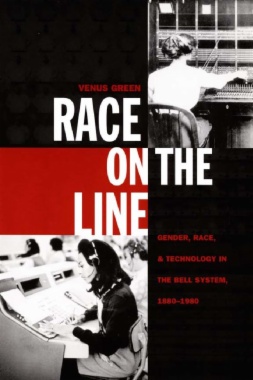Race on the Line is the first book to address the convergence of race, gender, and technology in the telephone industry. Venus Green—a former Bell System employee and current labor historian—presents a hundred year history of telephone operators and their work processes, from the invention of the telephone in 1876 to the period immediately before the break-up of the American Telephone and Telegraph Company in 1984. Green shows how, as technology changed from a manual process to a computerized one, sexual and racial stereotypes enabled management to manipulate both the workers and the workplace.
More than a simple story of the impact of technology, Race on the Line combines oral history, personal experience, and archival research to weave a complicated history of how skill is constructed and how its meanings change within a rapidly expanding industry. Green discusses how women faced an environment where male union leaders displayed economic as well as gender biases and where racism served as a persistent system of division. Separated into chronological sections, the study moves from the early years when the Bell company gave both male and female workers opportunities to advance; to the era of the “white lady” image of the company, when African American women were excluded from the industry and feminist working-class consciousness among white women was consequently inhibited; to the computer era, a time when black women had waged a successful struggle to integrate the telephone operating system but faced technological displacement and unrewarding work.
An important study of working-class American women during the twentieth century, this book will appeal to a wide audience, particularly students and scholars with interest in women’s history, labor history, African American history, the history of technology, and business history.
- Contents
- Preface
- Acknowledgments
- Introduction
- Part 1: The Beginnings of Telephony
- 1. "Hello Central": The Beginning of a New Industry
- 2. "Hello Girls": The Making of the Voice with a Smile
- 3. The "Ladies" Rebel: Unions and Resistance
- Part 2: The Dial Era, 1920-1960
- 4. "Goodbye Central": Automating Telephone Service
- 5. The Bell System Family: The Formation of Employee Associations
- 6. The Dial Era
- Part 3: The Computer Era
- 7. Racial Integration and the Demise of the "White Lady" Image
- 8. Black Operators in the Computer Age
- Epilogue
- Notes
- Selected Bibliography
- Index

